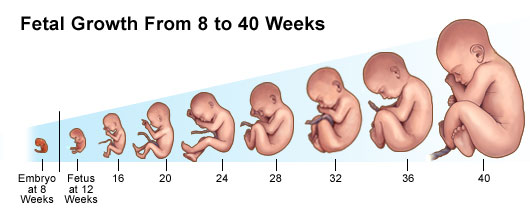Your baby will heartbeat, most likely, before you even know you’re pregnant. Your baby’s heartbeat starts from around 22 days after conception, although this will not be heard or seen for a while yet.
When Can I See My Baby’s Heartbeat?
Unless scheduled for an earlier scan, you will be called in for a scan from anywhere between 10-14 weeks pregnant. The earliest you will be able to detect your baby’s heart beat on-screen is from 5 weeks after your missed period. During your first ultrasound you may not be able to detect a heartbeat or even identify a ‘baby’ as such because of how tiny they are.
But don’t worry, you will be back for plenty of scans throughout your pregnancy so you’ve got plenty of opportunities to witness the beating of your baby’s heart. Your baby’s heart beat will be identified by a tiny flutter/flicker like movement.
When Can I Hear My Baby’s Heartbeat?
This is all dependent on your baby and the following points:
- The position of your baby,
- Your current weight,
- The accuracy of your due date.
You should be able to hear your baby’s heartbeat from around 10-12 weeks but everyone is different and sometimes your baby doesn’t want to play game. Your baby’s heart beat can often be heard as galloping horses or some say a train. It is an old wives tale that if your baby’s heartbeat sounds like a train, you’re expecting a little boy. But if your baby’s heartbeat sounds like galloping horses, you’re expecting a little girl. Whether you choose to believe this or not is your choice but I suppose it adds some fun to the guessing game.
Another way to decide the sex of your baby by their heart beat is by their heart rate and this is something that can be guessed as early as your first trimester. The following statements are yet another tale that you can choose if you believe but does actually have some medical belief behind it.
- If your baby’s heartbeat is over 140 bpm, you’re carrying a girl.
- If your baby’s heartbeat is under 140 bpm, you’re carrying a boy.
Faq
1. When does a baby’s heartbeat start during pregnancy?
- A baby’s heartbeat typically begins around the fifth or sixth week of pregnancy, usually becoming detectable via ultrasound around the sixth or seventh week.
2. How is a baby’s heartbeat detected during pregnancy?
- A baby’s heartbeat is commonly detected through an ultrasound, a non-invasive procedure that uses sound waves to create images of the uterus and the developing embryo.
3. What does a baby’s heartbeat signify during pregnancy?
- The emergence of a baby’s heartbeat signifies the early stages of the baby’s cardiovascular system development. It’s a crucial milestone and an emotional moment for expectant parents, confirming the presence of life within the womb.
4. Is the baby’s heartbeat constant throughout pregnancy?
- The baby’s heartbeat evolves as the pregnancy progresses. Initially, it might be relatively slow, around 100-120 beats per minute, increasing to an average of 120-160 beats per minute later in pregnancy.
5. What factors can affect a baby’s heartbeat during pregnancy?
- Various factors, such as the baby’s movement, maternal activity, or stress, can temporarily affect the baby’s heartbeat. However, regular monitoring by healthcare providers ensures the overall health and development of the fetus.
6. What does it mean if a baby’s heartbeat isn’t detected during early pregnancy?
- In some cases, a baby’s heartbeat might not be immediately detected during early ultrasounds. This could be due to factors like inaccurate dating or the stage of pregnancy. It’s essential to follow up with healthcare providers for further assessments.
7. How often is the baby’s heartbeat monitored during prenatal care?
- The baby’s heartbeat is routinely monitored during prenatal check-ups to ensure the baby’s growth and development. The frequency of monitoring may vary based on individual circumstances and healthcare provider recommendations.
8. Can a baby’s heartbeat indicate any potential complications during pregnancy?
- Changes in the baby’s heartbeat can sometimes indicate potential issues, such as fetal distress. Continuous monitoring and proper medical evaluation help in identifying and addressing any concerns promptly.



